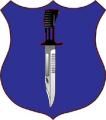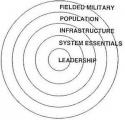
Originally Posted by
William F. Owen

Sorry, but the US has grabbed design because it no longer understands Campaign planning. if it did, "Design" would go in the bin. Nothing about Campaign design is anything to do with culture or "meta-cognition". Ask the men who could do it well.
I was referring to meta-cognition because Col. S.J. Banach in his article "The Art of Design" (Military Review March-April 2009) put it at the base of critical thinking:
"Reflective thinking. Reflective thinking draws on research in developmental psychology on the topic of metacognition. Metacognition is defined as “knowledge that takes as its object or regulates any aspect of any cognitive endeavor.”14 This involves two separate kinds of knowledge. The first is knowledge
about cognition—what do I know, what cognitive
abilities do I have, and how does this help me to learn about the situation at hand? The second is knowledge about how to regulate and control cognitive
activity—how do I avoid falling into commoncognitive traps, and how should I balance my cognitive
resources among understanding the environment,
the problem, and the solution? Designers need both types of metacognitive knowledge to become reflective thinkers. Through reflection, designers can continue to improve both their knowledge of their own ability and their capacity to regulate the cognitive focus of themselves and their team.
2. OK, and how do I use this dubious insight to train a Divisional Staff? Bill Slim, and Allenby did not read Miyamoto Musashi, yet were masters of their art.
I completely agree. Design seems to be a human-engineering effort to replicate the genius of Commanders like the ones you mentioned, and make it a "scientific" tool to organize a collective intellectual effort. Nothing bad so far, but the military professionals who are trying to develop and use it should understand the logical framework of this tool, that is the Complex Adaptive Systems Theory. There are thousands of papers already produced to explain this theory, and we are now assisting at the development of this theory in the military thinking. The "void" tells us that changing the name to things does not change their nature. For example, the Santa Fe Insitute, has developed a CAS perspective, the so called "3rd Culture", which could be understood as a way of viewing things between the social scienses and mathematics (for example, using biology to understand social behaviours within a living system). As you can appreciate, meta-cognition and culture matter, expecially in Design, because you can loose the point of origin of what you are talking about.
3. Sorry you've lost me, as does most the writing on "Design." The inability to clearly and simply state the problem and answer the exam question is why "Design" is pseudo-intellectual twaddle.
However, I am not closed minded, and remain open to other points of view, simply and clearly set forth.











 . Let’s call it what it is “A Discourse on Winning and Losing”.
. Let’s call it what it is “A Discourse on Winning and Losing”.  ) counter-attacks at the end of WW1…but I also think that the historians of Verdun would also think that it does not works.
) counter-attacks at the end of WW1…but I also think that the historians of Verdun would also think that it does not works.



Bookmarks